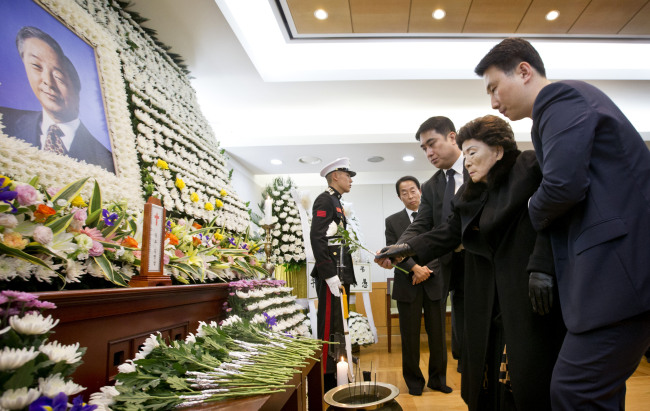South Korea will arrange a five-day state funeral for late former President Kim Young-sam, who died early Sunday, with national flags to be hoisted to half-mast to mourn the loss of the controversial yet iconic leader.
He will be buried at the Seoul National Cemetery in Seoul. All expenses of the ceremony will be paid by the National Treasury in line with the State Funeral Act, the Ministry of the Interior said Sunday.
A National State Funeral Committee will be established for Kim’s funeral. The six-member body, to be headed by Prime Minister Hwang Kyo-ahn, will be responsible for organizing the funeral parlor, supervising the carrying of the coffin and running the funeral and burial ceremonies. Kim’s family members will have the right to recommend members of the committee.
 |
| Sohn Myung-soon (second from right), the former First Lady and the wife of the late former President Kim Young-sam, pays a tribute to her late husband at the funeral hall set up at the Seoul National University Hospital in Seoul, Sunday. Yonhap |
After a five-day mourning period, Kim’s funeral ceremony will be held in front of the National Assembly Building in Seoul on Thursday at 2 p.m. Following the ceremony, Kim’s remains will be moved to and buried at the Seoul National Cemetery, where late Presidents Syngman Rhee, Park Chung-hee and Kim Dae-jung are interred.
The burial site was selected after the Ministry of National Defense and the Ministry of Patriots and Veterans Affairs discussed the matter with Kim’s family members.
The Ministry of the Interior also announced that memorial altars will be set up nationwide, including at the National Assembly and South Korean embassies overseas, so mourners can pay tribute to the late leader.
“Late President Kim Young-sam devoted his entire life to the establishment of democracy of this country,” said Prime Minister Hwang. “The government will do everything it can to support this funeral ceremony to pay respect to the late leader and his legacies.”
According to the current State Funeral Act, which was revised last year, a state funeral may be given to a former or incumbent president, a president-elect or any person who was respected for having rendered distinguished service to society, after consulting with their family.
Kim will be the first former president to be given a state funeral since the law was revised. Under the former law, which was enacted in 1967, family members of former presidents had an option of holding a “state funeral (gukjang),” which lasted for less than nine days, or a “national funeral (gukminjang),” which lasted for less than seven days.
The revision combined the two types of funerals into one — a state funeral (gukgajang) that lasts five days with all associated costs covered by the government.
In the past, late former presidents were given different types of funerals.
Former President Park Chung-hee, who was assassinated in 1979, was given the nation’s first state funeral (gukjang) and was buried at the Seoul National Cemetery in Seoul. Some 1,700 memorial altars were established nationwide during the nine-day mourning period, including at Cheong Wa Dae, and some 480 million won ($414,000) was spent for the funeral.
Late former President and Nobel Peace Prize laureate Kim Dae-jung (1924-2009), who died to multiple organ dysfunction syndrome, was also given a state funeral (gukjang). He was the second person in South Korean history after Park to be given a state funeral before the law’s revision. The ceremony was held in front of the National Assembly building and he was eventually interred at the Seoul National Cemetery according to Catholic traditions. Some 2.09 billion won worth of state funds were spent for his funeral.
Former Presidents Roh Moo-hyun (1946-2009), who died of self-inflicted injury, and Choi Kyu-ha (1919-2006), who died of heart disease, were given national funerals (gukminjang). Roh’s body was cremated and interred in his hometown of Bongha, located in Gimhae, South Gyeongsang Province. Choi, on the other hand, was buried at the Daejeon National Cemetery.
Not all presidents were given public funerals. South Korea’s first President Syngman Rhee (1875-1965) died of a stroke in 1965 while in exile in Honolulu, Hawaii. He was given a private funeral, although his body was eventually returned to Seoul and buried at Seoul National Cemetery.
Korea’s second President Yoon Bo-seon (1897-1990), who died of old age, was given a relatively small private funeral, according to his family members’ wishes. The ceremony was held at the Andong Presbyterian Church in Anguk-dong, Seoul, where he had been a devoted member. Only a single memorial altar was established during the mourning period, which was at his home in Anguk-dong, Seoul. Yoon was buried in his native Asan, South Chungcheong Province.
By Claire Lee (dyc@heraldcorp.com)

